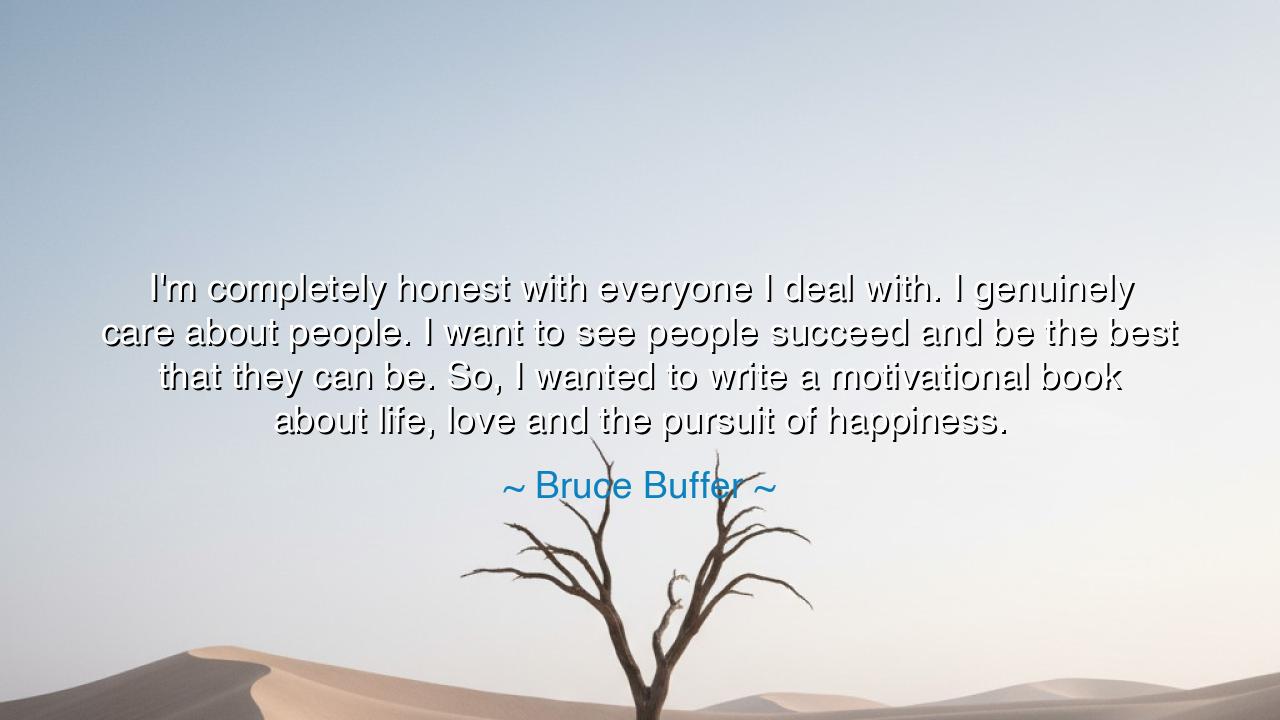
I'm completely honest with everyone I deal with. I genuinely care
I'm completely honest with everyone I deal with. I genuinely care about people. I want to see people succeed and be the best that they can be. So, I wanted to write a motivational book about life, love and the pursuit of happiness.






The voice of the arena, Bruce Buffer, known to millions as the herald of champions, once declared: “I'm completely honest with everyone I deal with. I genuinely care about people. I want to see people succeed and be the best that they can be. So, I wanted to write a motivational book about life, love and the pursuit of happiness.” Behind these words, spoken by a man famed for energy and showmanship, lies a wisdom as old as civilization itself—the truth that strength is not measured by the loudness of one’s roar, but by the authenticity of one’s heart. For in honesty, compassion, and the desire to lift others lies the highest form of greatness: the greatness of character.
The meaning of this quote rests upon three pillars—honesty, empathy, and service. To be “completely honest” with others is not merely to speak truth, but to live truth—to carry no deceit in one’s dealings, no shadow in one’s intentions. It is to move through the world with transparency of spirit, so that one’s words and actions shine like clear glass. Yet honesty without empathy can become cruelty, and empathy without honesty can become weakness. Thus, Buffer joins both virtues, declaring that he genuinely cares about people, and that his purpose is not to rise above others, but to raise them with him. This is the spirit of true motivation, for leadership is not the pursuit of personal triumph, but the art of awakening greatness in others.
The origin of this wisdom is found not in the world of sport alone, but in the timeless pattern of humanity’s heroes—those who transform their own success into a beacon for others. Bruce Buffer’s career, from struggle to stardom, is itself a parable of perseverance. Long before he was the voice of the Octagon, he was a man fighting unseen battles, seeking purpose, honing his craft. In his rise, he discovered that the pursuit of glory is hollow unless it is shared—that the true reward of triumph is the ability to inspire. Thus, his desire to write a motivational book was not born from vanity, but from gratitude—from the realization that wisdom gained through hardship must be given back to the world as a gift.
History echoes with examples of men and women who embodied this same truth. Consider Marcus Aurelius, emperor of Rome and philosopher of humility. Surrounded by wealth, power, and temptation, he chose not to revel in dominance, but to guide others toward virtue. His Meditations were written not as boast, but as service—to remind himself and all who followed that the only empire worth ruling is one’s own soul. Or think of Mahatma Gandhi, whose strength lay not in conquest but in compassion. He, too, believed in honesty, in the care for others, and in helping humanity become “the best that it can be.” These figures, like Buffer in his own modern way, show that true power is not found in domination, but in the quiet force of integrity and goodwill.
There is also a lesson here about the nature of happiness. Buffer speaks of “the pursuit of happiness,” echoing the timeless words of Jefferson and the Founders, yet his pursuit is not one of selfish gain. He reveals that happiness is not taken—it is created through connection, through contribution, through love. The happiest souls are not those who accumulate wealth or applause, but those who live with purpose and give without measure. Happiness, like fire, grows brighter when shared; it dies when hoarded. Thus, in wanting to “see people succeed,” Buffer affirms that joy multiplies when it helps others to rise.
To live according to these words requires courage, for honesty can make enemies, and compassion can make one vulnerable. But these are the necessary risks of authentic living. The world is full of masks and pretenders, yet those who dare to be real—who speak truth with love and act with sincerity—become anchors of trust in the storm. They are the ones others turn to in doubt, for their presence brings calm, and their example brings light. Every man and woman has the power to become such a beacon, if only they choose to live with the same transparency and kindness that Bruce Buffer describes.
The practical wisdom in his words is clear: begin each day with truth. Speak plainly, but with care. Seek not only your own ascent, but the ascent of all who journey with you. When you meet others, look not for what they can give, but for how you can strengthen them. Encourage, uplift, remind them of their worth. For to make others stronger is to make the world more whole—and to make the world more whole is to make yourself complete.
So, let this teaching be passed down: that the greatest legacy is not fame, but influence born of sincerity. To be honest, to care, to help others become their best selves—this is the path to fulfillment that neither fortune nor failure can take away. As Bruce Buffer reminds us, life, love, and happiness are not things to be won in the ring of competition, but to be cultivated in the heart. And when we live by these virtues, we become not mere spectators of greatness—but its living embodiment, echoing across time, calling others to rise.






AAdministratorAdministrator
Welcome, honored guests. Please leave a comment, we will respond soon